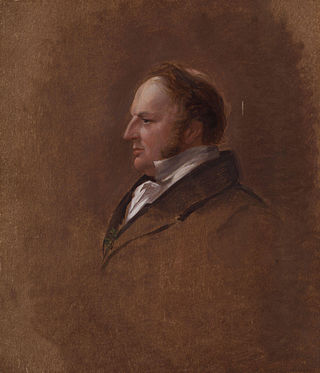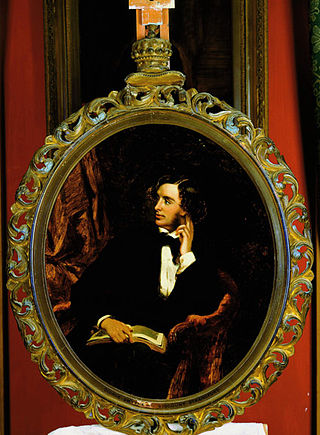
Sir Robert Peel, 2nd Baronet,, was a British Conservative statesman who served twice as Prime Minister of the United Kingdom, simultaneously serving as Chancellor of the Exchequer (1834–1835), and twice as Home Secretary. He is regarded as the father of modern British policing, owing to his founding of the Metropolitan Police Service. Peel was one of the founders of the modern Conservative Party.
The Tories were a loosely organised political faction and later a political party, in the Parliaments of England, Scotland, Ireland, Great Britain and the United Kingdom. They first emerged during the 1679 Exclusion Crisis, when they opposed Whig efforts to exclude James, Duke of York from the succession on the grounds of his Catholicism. Despite their fervent opposition to state-sponsored Catholicism, Tories opposed his exclusion because of their belief that inheritance based on birth was the foundation of a stable society.

St Patrick's Pontifical University, Maynooth, is a pontifical Catholic university in the town of Maynooth near Dublin, Ireland. The college and national seminary on its grounds are often referred to as Maynooth College.
Young England was a Victorian era political group with a political message based on an idealised feudalism: an absolute monarch and a strong Established Church, with the philanthropy of noblesse oblige as the basis for its paternalistic form of social organisation. For the most part, its unofficial membership was confined to a splinter group of Tory aristocrats who had attended Eton and Cambridge together, among them George Smythe, Lord John Manners, Henry Thomas Hope and Alexander Baillie-Cochrane. The group's leader and figurehead was Benjamin Disraeli, who bore the distinction of having neither an aristocratic background nor a public school or university education. Young England promulgated a conservative and romantic species of social Toryism.

Sir Robert Harry Inglis, 2nd Baronet, FRS was an English Conservative politician, noted for his staunch high church views.

George Smythe, 7th Viscount Strangford, styled The Honourable George Smythe until 1855, was a British Conservative politician, best known for his association with Benjamin Disraeli and the Young England movement. He served briefly as Under-Secretary of State for Foreign Affairs in 1846 under Sir Robert Peel.

The Catholic Association was an Irish Roman Catholic political organization set up by Daniel O'Connell in the early nineteenth century to campaign for Catholic emancipation within Great Britain. It was one of the first mass-membership political movements in Europe. It organized large-scale public protests in Ireland. Home Secretary Robert Peel was alarmed and warned an associate of his in 1824, "We cannot tamely sit by while the danger is hourly increasing, while a power co-ordinate with that of the government is rising by its side, nay, daily counteracting its views." The Duke of Wellington, Britain's prime minister and its most famous war hero, told Peely, "If we cannot get rid of the Catholic Association, we must look to civil war in Ireland sooner or later." To stop the momentum of the Catholic Association it was necessary to pass Catholic Emancipation, and so Wellington and Peel turned enough Tory votes to win. Passage demonstrated that the veto power long held by the Ultra-Tories faction of reactionary Tories no longer was operational, and significant reforms were now possible.
In Ireland, the penal laws were a series of legal disabilities imposed in the seventeenth, and early eighteenth, centuries on the kingdom's Roman Catholic majority and, to a lesser degree, on Protestant "Dissenters". Enacted by the Irish Parliament, they secured the Protestant Ascendancy by further concentrating property and public office in the hands of those who, as communicants of the established Church of Ireland, subscribed to the Oath of Supremacy. The Oath acknowledged the British monarch as the "supreme governor" of matters both spiritual and temporal, and abjured "all foreign jurisdictions [and] powers"—by implication both the Pope in Rome and the Stuart "Pretender" in the court of the King of France.
The Irish Conservative Party, often called the Irish Tories, was one of the dominant Irish political parties in Ireland in the 19th century. It was affiliated with the Conservative Party in Great Britain. Throughout much of the century it and the Irish Liberal Party were rivals for electoral dominance among Ireland's small electorate within the United Kingdom of Great Britain and Ireland, with parties such as the movements of Daniel O'Connell and later the Independent Irish Party relegated into third place. The Irish Conservatives became the principal element of the Irish Unionist Alliance following the alliance's foundation in 1891.
The Ultra-Tories were an Anglican faction of British and Irish politics that appeared in the 1820s in opposition to Catholic emancipation. The faction was later called the "extreme right-wing" of British and Irish politics.
Charles McNally was the Roman Catholic Bishop of Clogher in Ireland.
Father Patrick Lavelle (1825–1886) was a priest and Irish nationalist. Lavelle was born in Mullagh, Murrisk, Co. Mayo, the son of Francis Lavelle a farmer. He was educated at the local hedge school and St Jarlath's College, Tuam. In 1844 he went to Maynooth College and was ordained a Catholic priest at St. Patrick's College, Maynooth, in 1851, and pursued postgraduate studies there as part of the Dunboyne Establishment. He was appointed in 1854 as a professor of philosophy in the Irish College in Paris against the wishes of rector Rev. Dr. John Miley, Lavelles radical politics would have been at odds with Miley who was supported by Cardinal Cullen, the other bishops supported lavelle. Along with philosophy, he taught the Irish Language at the college. He left Paris in 1858 and returned to Ireland.
James MacCaffrey STL, PhD was an Irish Catholic priest, theologian, and historian.
Monsignor Michael G. Olden BA, BD, DHistEccl. was an Irish priest, historian and educator who served as President of Maynooth College from 1977 to 1985 and hosted the visit of Pope John Paul II to the college in 1979.
Anti-Maynooth Conference was a conference hosted in London in May 1845 by Conservatives, evangelical Anglicans and the Protestant Association to campaign against the Maynooth Grant and British State funding of the Roman Catholic Maynooth College. Opponents of the Maynooth Bill formed a committee and held a conference in the Rotunda, in Dublin.

The Maynooth College Act 1845 was an Act of the Parliament of the United Kingdom.

The Russell Library is situated in Maynooth, County Kildare, in the Republic of Ireland on the campus of St Patrick's College, Maynooth. It houses the historical collections of St Patrick's College, which was established in 1795. The Russell Library is home to significant collections, manuscripts, and archival holdings, notably the Salamanca archive documents which date back to 1751. There is also a collection of incunabula such as a 1482 volume set on moveable type and an illuminated collection of medieval and Gaelic manuscripts. There are over 2,500 bibles, which include 493 long bibles. The Russell Library was the main library in Maynooth until the opening of the John Paul II Library in 1981 which is now the main library for both students of Maynooth University and St Patrick's College. Access to the Russell Library is by appointment only. However, during the summer the library holds exhibitions which are open to the public. The exhibitions typically last from the end of June to the end of July.
Joseph Ranson (1906–1964) was an Irish Catholic priest, archivist and historian, who served as the last Rector of the Irish College at Salamanca.
Louis-Gilles Delahogue (1739-1827) was a French priest and academic, who was exiled following the French Revolution and moved to Ireland. His surname particularly in French is sometimes written as De La Hogue. Delahogue graduated from the Sorbonne and was a Professor of Sacred Scripture at the University of Paris, Sorbonne and Royal Censor from 1772 until after the revolution. Initially, after the September massacres in Paris in 1792, Delahogue found refuge and employment in London, England, where he spent six years before he moved to Ireland. In 1798, he was appointed the professor of Moral Theology, at the newly established Royal College of St. Patrick, Maynooth, Ireland. In 1801 he moved from Moral Theology to succeed Rev. Maurice Aherne as Professor of Dogmatic Theology.
Francois (Francis) Anglade (1758–1834), was a French priest and academic, who was exiled following the French revolution and moved to Ireland.







